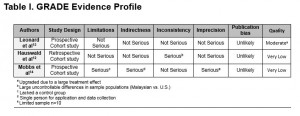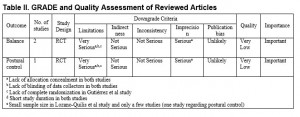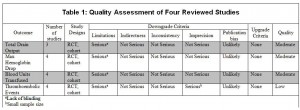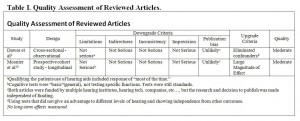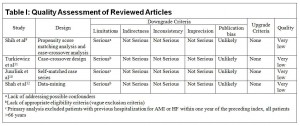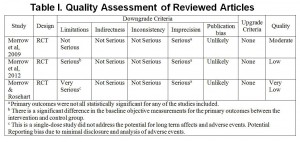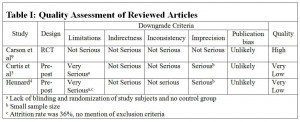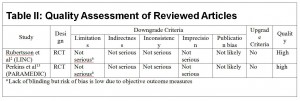Spinal Immobilization Adverse Effects vs. Benefits in the Trauma Patient ABSTRACT Background: Spinal Immobilization is a standard practice of preventing further injury to trauma patients with suspected severe spinal injuries. Clinical providers employ spinal immobilization devices as soon as traumatic spinal injuries are suspected. The use of spinal immobilization devices is not benign and can cause […]
You are browsing archives for
Category: Students
Tyler McKinnon: PCSK9 as a Biomarker for...
PCSK9 as a Biomarker for Cardiovascular Risk ABSTRACT Background: Proprotein convertase subtilisin/kexin 9 (PCSK9) is a protein that prevents low-density lipoprotein (LDL) clearance from plasma through degradation of low-density lipoprotein receptors (LDL-R). Mutations that up- or down-regulate PCSK9 have been shown to affect risk of cardiovascular disease independently of plasma LDL level. In light of […]
Theresa Jones: The Use of Kinect to Impr...
The Use of Kinect to Improve Balance and Postural Control in Patients with Multiple Sclerosis ABSTRACT Background: Multiple sclerosis (MS) is a leading cause of disability in young adults, affecting women more than men. Many MS patients experience gait difficulties due to muscle weakness and loss of balance and postural control. Standard interventions for maintaining […]
Erin Raley Wilson: The Safety and Effica...
The Safety and Efficacy of Topical Tranexamic Acid Versus Intravenous Tranexamic Acid in Total Knee Arthroplasty ABSTRACT Background: Perioperative blood loss is of major concern for patients undergoing a total knee arthroplasty (TKA). Multiple studies have confirmed the ability of tranexamic acid (TXA), an antifibrinolytic agent, to effectively reduce blood loss and transfusion rates following […]
Kaipo Lindsey: Hearing Technology Improv...
Hearing Technology Improves Cognition in Adults with Presbycusis ABSTRACT Background: Hearing loss due to the aging process, or presbycusis, is a well-known condition that affects all ages with a prevalence that increases with age. If left untreated, presbycusis has been found to be a risk factor for cognitive decline. Will treating presbycusis improve cognition? Methods: […]
Natasha Ludwig: Concern for Myocardial I...
Concern for Myocardial Infarction Risk Associated with Proton Pump Inhibitor Use in Patients With No Underlying Cardiovascular Disease ABSTRACT Background: Proton pump inhibitors (PPIs) are the drugs of choice when it comes to the treatment of dyspepsia and gastroesophageal reflux disease (GERD). Recently, the FDA issued a warning regarding concomitant use of omeprazole, a PPI, […]
David Bull: Use of Selective Serotonin R...
Use of Selective Serotonin Reuptake Inhibitors During Pregnancy and Risk of Congenital Cardiac Malformations ABSTRACT Background: Untreated maternal depression has been shown to have adverse effects in many children, yet how the mother should be treated is not clear and can vary with the situation. The use of selective serotonin reuptake inhibitors (SSRIs) during the first […]
Hayley Kum: The Use of Amphetamines for ...
The Use of Amphetamines for Improving Cognitive Impairment in Patients with Multiple Sclerosis ABSTRACT Background: Multiple sclerosis (MS) is an autoimmune disorder that results in debilitating cognitive impairment in 40-65% of patients. There are no current treatments for this symptom of MS. This is a systematic review of literature on the impact amphetamines have on […]
Rachel K. Johnson: Yoga as an Effective ...
Yoga as an Effective Therapy to Reduce Symptoms in Patients with Fibromyalgia ABSTRACT Background: Fibromyalgia is a debilitating chronic disease characterized by musculoskeletal pain, fatigue, and compromises in cognition. One of the biggest challenges surrounding fibromyalgia is proper diagnosis, as there is no current diagnostic test established. Most practitioners utilize examining tender points and other […]
Larissa Fritts: Mechanical Compressions ...
Mechanical Compressions Versus Manual Compressions in Cardiac Arrest ABSTRACT Background: More than 350 000 people suffer an out of hospital cardiac arrest every year. Even when medical providers have adequate training it can be difficult to carry out an effective resuscitation due to suboptimal CPR, multiple interventions needing to be done simultaneously, and many other […]

